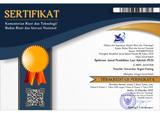Community Education in the Perspective of Student Scientific Works 2012-2022
 ), Deti Nudiati(2),
), Deti Nudiati(2), (1) Universitas Pendidikan Indonesia
(2) Universitas Pendidikan Indonesia
 Corresponding Author
Corresponding Author
DOI : https://doi.org/10.24036/spektrumpls.v11i1.120588
Full Text:
 Language : en
Language : en
Abstract
The thesis, which is one of the scientific research activities, aims to find answers to a problem in a scientific manner. In educational thesis, the research activity is directed towards understanding various issues and phenomena in education, across all educational levels, and in every aspect. Thus, ideally, the thesis in community education should use social phenomena and issues as the source of its research problems. This study aims to provide an empirical overview of how social issues are used as research problems in community education thesis and how these issues have evolved in society over the past 10 years (2013-2022), as well as any possible correlations between the two. The research was conducted using a descriptive quantitative approach on 492 community education student thesis titles. The results show that the three main social issues in the thesis are the quality of education, human resource quality, and economic and welfare disparities, and these three major issues have different focuses compared to national social issues during the 10-year period. The discussion trend in the thesis is consistent with the basic concept of community education that examines the philosophy of education that underlies school society, encouraging opportunities for members of society, including individuals, schools, businesses, and public or private organizations, to become partners in meeting community needs. However, compared to national issues, the correlation between the social issues researched by students is very weak, and this is a challenge for community education stakeholders to minimize the gap between academic discussion and social phenomena in society.
References
Bungin, Burhan. (2015). Metodologi Penelitian Kuantitatif: Komunikasi, Ekonomi, dan Kebijakan Publik Serta Ilmu-ilmu Sosial lainnya. Jakarta: Kencana Prenada
Connolly, B. (2003). Community Education:Listening to the voices.
Decker, LE, and Boo, MR (2001). Community schools: Serving children, families, and communities. Fairfax, VA: National Community Education Association
Decker, L.E & Decker, V.A. 2003. Home, School, and Community Partnership. Oxford: Scarecrow Press, Inc.
Kemdikbud. (2020). Peraturan Menteri Pendidikan dan Kebudayaan Republik Indonesia No 6 Tahun 2020 tentang Penerimaan Mahasiswa Baru Program Sarjana Pada Perguruan Tinggi Negeri
Kemenristekdikti. (2018).Peraturan Mentri Riset, Teknologi, dan Pendidikan Tinggi No. 50 tahun 2018 tentang Perubahan Atas Peraturan Mentri Riset, Teknologi, dan Pendidikan Tinggi No 44 Tahun 2015 tentang Standar Nasional Pendidikan Tinggi.
KBBI, 2022. Kamus Besar Bahasa Indonesia (KBBI). [Online] Available at: https://kbbi.web.id/perspektif (Diakses 30 September 2022)
Nazir, Moh. (2013). Metode Penelitian. Bogor: Ghalia Indonesia.
Soekanto, Soerjono. (1990). Sosiologi Suatu Pengantar. Jakarta: Raja Grafindo Persada
Sudiapermana, E., (2021). Pendidikan Masyarakat: Merdeka Belajar dan memerdekakan. Bandung: Frasa Media
Sumaatmadja dan Winardit. Perspektif Global. Jakarta:UT, 1999.
Suhanadji & Waspada TS. 2004. Administrasi Pemerintahan Desa. Yogyakarta: Graha Ilmu.
Sukardi. (2014). Metodologi penelitian pendidikan kompetensi dan praktiknya. Jakarta: Bumi Aksara.
White, C. (2014). Encountering Social and Community Education. In: White, C. (eds) Community Education for Social Justice. SensePublishers, Rotterdam. https://doi.org/10.1007/978-94-6209-506-9_1
 Article Metrics
Article Metrics
 Abstract Views : 438 times
Abstract Views : 438 times
 PDF Downloaded : 154 times
PDF Downloaded : 154 times
Refbacks
- There are currently no refbacks.

This work is licensed under a Creative Commons Attribution-NonCommercial 4.0 International License.



